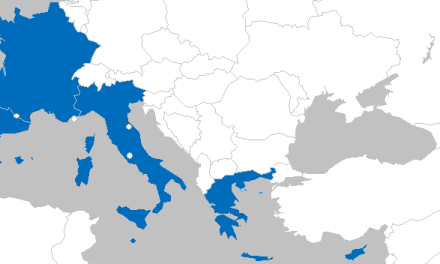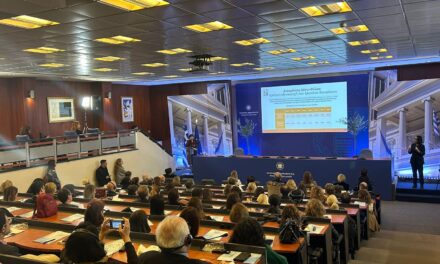In an interview with Avgi Sunday newspaper (8.1.2018), Alternate Minister for Research and Innovation Costas Fotakis stressed that while Greece possesses excellent scientific human potential whose performance has international reach, its innovation rates relatively low and describes various governmental policies and initiatives to overturn this “paradox”*:
You often talk about creating a new productive model and transitioning to knowledge based economy. Could you elaborate?
In Greece, a “paradox” has prevailed for several decades: While the country possesses excellent scientific human potential whose performance has international reach, its innovation rates are well below the EU average and entrepreneurship is characterized by medium or low levels of knowledge-intensity.
This “paradox” is due to a series of historical and social characteristics that have shaped the modern Greek state and largely determines the country’s position in today’s global division of labour. The innovation gap is linked to the economy being trapped in a position of low-skills and reduced competitiveness.
Our aim is to overturn this by proposing a new production model grounded in knowledge-based economy, i.e. an economy that makes good use of knowledge stemming from research and generated innovation; an economy based on the production of quality products and services of great added value.
 It must be underlined that, depending on the ideological trends prevailing and the policies implemented, a knowledge-based economy could be a powerful pillar of development as well as a springboard for social emancipation, promoting healthy and innovative entrepreneurship as opposed to state-owned and parasitic past practices.
It must be underlined that, depending on the ideological trends prevailing and the policies implemented, a knowledge-based economy could be a powerful pillar of development as well as a springboard for social emancipation, promoting healthy and innovative entrepreneurship as opposed to state-owned and parasitic past practices.
Why would a young researcher who has gone abroad return to Greece?
According to related studies, the main reasons for the brain drain are the absence of scientific career prospects and prevailing working conditions, followed by low salaries.
This trend has escalated, particularly on account of the general depreciation of labour in the years of the crisis and has multiplied tenfold compared to the years before the crisis.
Thus, apart from decent wages, the policy we have formulated to address the brain-drain focuses on creating career prospects and satisfactory working conditions in attractive environments to conduct aspiring research work. For example, with the 2016 Research Law, possible arbitrariness in the management of Research Centres is scrutinized without sacrificing the pursuit of scientific quality. It also allows young scientists, mainly post-doctoral scientists, to be themselves responsible for the research project proposals they submit.
The first faint traces of brain-drain containment observed are attributed to the impact of this measure, which encourages and supports the creative and scientific abilities of young researchers through the formation of their own research teams, creating substantial opportunities for their scientific development. Out of 1669 proposals submitted to the Hellenic Foundation for Research and Innovation (ELIDEK) for post-doctoral projects, 160 come from Greek scientists working abroad who wish to return to Greek Universities and Research Centres to work on the research projects they have proposed.
The development of opportunities for scientific work in the private sector, with measures supporting the R&D capabilities of innovative businesses, is another approach to attracting specialized scientists from abroad.
Finally, I would like to point out that those Greek scientists abroad who have established strong ties to the countries they live in and find it hard to return to Greece can now join the country’s development effort through the Knowledge Bridges programme of the Ministry of Economy and Development.
What position does our country hold in the field of innovation and research on the world map, and in what ways could its image be improved?
As regards scientific performance, Greece ranks among the top 25 countries in the world, according to OECD figures. In terms of innovation indicators, however, Greece is ranked 22nd among the EU-28 countries and much lower in world ranking. This is the paradox I referred to earlier. To improve this image, research policy focuses on three areas.
Firstly, on supporting and strengthening the country’s human resources, and upgrading and enhancing scientific infrastructure. The Hellenic Foundation for Research and Innovation (ELIDEK), founded in 2016, is the cornerstone for achieving this goal. The significant increase in public spending on research, which more than doubled over the last three years, is typical of the government’s intentions. It is noteworthy that even in the private sector, R&D expenditures increased significantly, mainly from own revenues, by €219 million in the three-year period 2014-2016, a tangible sign of confidence in the Greek economy. I believe that recent economic studies that talk of a downturn in entrepreneurship need to take such data into account. Overall, in 2016, amidst the crisis, the GDP percentage rate for R&D expenditures stood at 0.99%, up by €245 million as compared to 2014.
The second area concerns support for innovative entrepreneurship. The forthcoming allocation of public funding totaling € 393.7 million from the “Research – Create – Innovate” programme has recently been announced by the Special Management Agency of the General Secretariat for Research and Development for 685 research projects, of which 498 concern business partnerships with public research bodies. This is a prime example of the level of funding and it is estimated it will support around 4,400 new quality jobs. Never before had there been such funding! In addition, new opportunities for innovative entrepreneurship arise with the establishment in 2016 of the EquiFund Venture Capital Fund which is aptly suited to the current requirements of the country’s economy, and is ready to work by supporting the use of research results through the creation of start-ups, the operation of innovative businesses at an early stage, but also when maturing and expanding.
The third area concerns the undertaking of flagship initiatives by the state on issues of major social impact. For example, recently, on the initiative of the Ministry, the Network for Personalized Medicine / Medical Precision was created, bringing the country’s medical practice forward into the future. The goal initially is research and clinical applications for the prevention and treatment of cancer with modern approaches to molecular medicine accessible by the Public Health System. Cooperation with the Ministry of Health is at the heart of this initiative. Another flagship initiative, in collaboration with the Ministry of Rural Development and Food, concerns the implementation of innovative technologies in agri-food, to highlight the special characteristics of Greek agricultural production with the aim of creating added value in Greek agricultural products.
Do Greek universities offer the necessary resources for conducting research? What changes could be made?
I can unambiguously affirm that yes, even if there is always room for improvement. Greek Universities and Research Centres certainly offer opportunities for conducting high level research. I will refer to two things alone that demonstrate this fact. Greek research teams have been very successful in claiming European funding, ranking 11th among the EU-28 countries. Moreover, the excellent scientific training provided by Greek Universities and research centres is made obvious by the huge demand abroad for Greek scientists who have studied in Greek universities. All facts fly in the face of efforts to devaluate state Universities and Research Centres that have systematically attempted by political camps promoting deadlocked neo-liberal ideology.
The changes that could be made relate to lifting the aforementioned Greek “paradox”. The appropriate combination of institutional interventions and financial instruments, tailored to the country’s economic environment, is already under development to promote the utilisation of research results, without the distorted fetishism transforming all scientific knowledge into commodities and researchers into businessmen. The bankruptcy of this approach is evident in the widening of the innovation gap in the country in all previous years. On the other hand, if we set young scientists free from such trappings and allow existing human potential to flourish much could be achieved.
Why do you consider the establishment of a totally new foundation independent of any political leadership, such as the Hellenic Foundation for Research and Innovation, an urgent scientific and social necessity?
The Hellenic Foundation for Research and Innovation (ELIDEK) is the vehicle to address the accumulated maladies of the Greek research sector, as well as a key institutional intervention in the construction of the knowledge economy. Right from the start, ELIDEK has been a kind of “independent” scientific research authority so that the scientific community itself might shape the country’s research map. ELIDEK’s main purpose is to provide consistent and targeted support to the country’s research potential, to strengthen research infrastructures and to promote the quality of independent research conducted in Greek Universities and Research Centres without geographical or subject matter restrictions. For example, the humanities and social sciences, which are a pinnacle for the country and not funded by the National Strategic Reference Framework (NSRF) or other sources, are supported by ELIDEK.
ELIDEK, with the assistance of the General Secretariat for Research and Technology, has already approved 585 scholarships for PhD candidates following the evaluation of 2,144 applications and is completing the process of evaluating 1,669 proposals submitted by postdoctoral researchers, i.e. new scientists, to support their research projects. It has already published the call for proposals for research projects by University Teaching & Research Staff (TRS), Research Centre members, as well as for the procurement of high cost research equipment. Moreover, the 2nd call for PhD candidates is forthcoming. This is a report of substantial activity for the first 15 months of its operation.
So what is in the pipeline for the near future with regard to Research and Innovation?
In addition to the systematic and consistent continuation of building conditions of quality and trust in conducting high level research, we are preparing new legislative interventions on ethics in research and use of innovation. Our direct goals include attracting foreign and dynamic R&D companies in Greece, which would enhance the construction of knowledge economy and the prospects for productive investment in the positive economic landscape that is being shaped in 2018. We hope that soon we will be able say more.
*Translated by Magda Hatzopoulos
Read more via Greek News Agenda: “Research – Create – Innovate”: Connecting R&D with Enterprises; New Initiative on Research & Development funding, new era for Universities and SMEs; Hellenic Foundation for Research and Innovation to Strengthen Research across Greece; Marianna Mazzucato on Greece, EU and the Entrepreneurial State; Research Policy | Nektarios Tavernarakis on Foundation for Research and Technology-Hellas and Greece’s Research potential; Government | Policy: Lois Labrianidis on Greece’s comparative advantages and the “Knowledge and Partnership Bridges” initiative
















